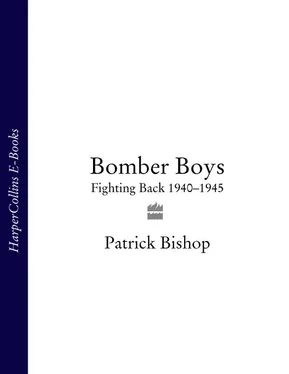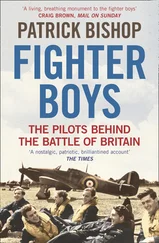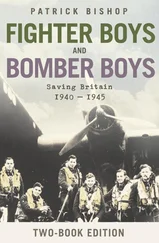The gap between what was expected of the RAF and what it could in fact deliver was enormous. The man whose task it was to narrow it was Charles Portal, appointed to the top air force post of Chief of the Air Staff (CAS) in October 1940 at the young age of forty-seven. The promotion came after a brief, six-month stint as the Commander-in-Chief of Bomber Command. He was to stay in his post for the rest of the war. Portal was short and stocky, with a lean, creased face, hooded eyes and a large, hooked nose which gave him the look of one of the falcons he had reared when a schoolboy at Winchester. He was at Christ Church, Oxford, when the war broke out in 1914, and immediately suspended his studies to go to France as a motorcyclist with the Royal Engineers. In 1915 he joined the Royal Flying Corps and finished the war as a lieutenant-colonel. His intellectual gifts and boundless capacity for work ensured that his subsequent climb was sure and fast. His character and demeanour contrasted sharply with that of Arthur Harris. He hid his feelings behind a mask of scrupulous courtesy and expressed himself quietly and subtly. Whereas Harris was capable of rough bonhomie, Portal never unbent. Those around him noticed that beyond his family he had no close friends, gently repelling company when he dined at the Travellers’ Club at the end of his long working day.
Portal’s part in the policy of attacking whole cities, ‘area bombing’ in the bureaucratic euphemism of the day, is little known or remembered nowadays, while Harris’s name will be linked to it for ever. But his enthusiasm for the project was, at the outset at least, just as great as that of his subordinate and he was prepared to express himself forcefully in support of it even when Churchill’s faith faltered.
As head of Bomber Command at the start of the Blitz he sympathized with the public desire for revenge and had joined Churchill in urging reprisals on a reluctant Air Staff. On arriving at the top, he stressed the need to destroy the resolve of the German people by smashing their towns and cities. The rhythms of Bomber Command’s activities would vary from time to time as it was diverted to deal with various threats and crises. But, until the run-up to D-Day, this was to be the central theme of the air war.
In successive directives Portal continued to point his men towards industrial and military targets. But great emphasis was given to the will-sapping potential that he claimed would result. On 30 October 1940, as London prepared to endure its 53rd night of continuous bombardment, he wrote to Sir Richard Peirse who had replaced him as C-in-C, Bomber Command, that
the time seems particularly opportune to make a definite attempt with our offensive to affect the morale of the German people when they can no longer expect an early victory and are faced with the near approach of winter and the certainty of a long war … if bombing is to have its full moral effect, it must on occasions produce heavy material destruction. Widespread light attacks are more likely to produce contempt for bombing than fear of it. I am therefore directed to say that as an alternative to attacks designed for material destruction against our primary objectives, it is desired that regular concentrated attacks shall be made on objectives in large towns and centres of industry with the prime aim of causing heavy material destruction, which will demonstrate to the enemy the power and severity of air bombardment and the hardship and dislocation that will result from it.
Berlin was put first on the list for Bomber Command’s attentions. If it was clouded over, other towns in central and western Germany were to be considered. Aircraft industry and oil targets might also be selected, as long as they were ‘suitably placed in the centres of the towns or populated districts’. The directive envisaged sending greater numbers of aircraft, carrying a mix of bombs. The first to arrive would drop incendiaries to set the target area ablaze. The following force would then ‘focus their attacks to a large extent on the fires with a view to preventing the fire-fighting services dealing with them and giving the fires every opportunity to spread.’ 4This amounted to an explicit announcement that the strategic aim now was to achieve blanket destruction, disruption and death.
In reality, Bomber Command lacked the resources to carry out such an apocalyptic plan. Even if it had the aircraft and equipment, it would never be able to mount a concentrated and relentless campaign while it was subject to the apparently insatiable calls on its services from the War Cabinet, navy and army.
On top of the strategic targets, oil and now cities, Bomber Command was supposed to support the navy by laying mines at sea. In March 1941 another great responsibility was loaded on to its shoulders. German submarines and bombers were wreaking terrible damage on the transatlantic convoys carrying the cargoes that kept Britain alive and threatening to sever Britain’s vital ocean links with America. Churchill ordered Portal to concentrate on attacking the yards that built the U-boats and the pens where they sheltered, as well as the factories and bases which produced and housed the maritime bombers. Bomber Command did its best against these targets, and the great German warships Gneisenau and Scharnhorst in their haven at Brest, but the effects were limited. Its aircraft were withdrawn after four months and it was left to Coastal Command and the Royal Navy, aided by improvements in technology and resources, to turn the Battle of the Atlantic Britain’s way.
The diversion deflected Peirse from his intention to use the improved conditions of spring to systematically pursue oil targets. The ‘oil plan’ had many powerful supporters inside the Air Staff and among civilian specialist strategic advisers. They saw the destruction of synthetic oil plants, which transformed Germany’s rich coal reserves into liquid fuels and lubricants, as a quick way of bringing the enemy to its knees. The plan would swing in and out of favour throughout the war. But the prescription was easier than the practice. Despite the claims of official propaganda, when oil targets were attacked, the results were often miserable. The plants were sited away from the big towns and were hard to find and even harder to destroy or damage. If the bombers missed them, as they usually did, their bombs hit nothing but fields and forests. The new practice of using high-flying Spitfires for photo reconnaissance the morning after a raid allowed an operation’s success to be assessed scientifically rather than relying on the visual reports and blurry night-time images submitted by the crews from onboard cameras. In the absence of hard evidence, optimism about the progress of the campaign had remained high in the upper reaches of the RAF. The daylight pictures showed it to be misplaced. No assumptions could be made about bombing accuracy. The truth, according to Sir John Slessor, who had taken over 5 Group of Bomber Command in May 1941, was that the crews were ‘failing to find and hit any but the most obvious targets on the clearest moonlight nights’. 5
It became clear to Portal that, as things stood, the only target that Bomber Command could be guaranteed to find was a largish town. The attacks on London, Coventry, Southampton, Plymouth and elsewhere had provided more than enough justification for retaliating in kind. Britain had suffered an unprecedented loss of innocent life. By the time the Blitz petered out in May 1941, more than 41,000 civilians had been killed and 137,000 injured. Such a policy, Portal now believed, was not simply faute de mieux , but a logical and desirable course of action.
The new, or rather resumed, thinking was spelled out in another Portal directive to Bomber Command dated 9 July 1941. It stated that a comprehensive review of Germany’s political, economic and military situation disclosed that one of ‘the weakest points in his armour’ lay in the morale of the civilian population. It called for ‘heavy, concentrated and continuous area attacks of large working-class and industrial areas in carefully selected towns’. At the end of August the formula was extended to smaller towns so that they too could experience ‘the direct effect of our offensive’. 6
Читать дальше












